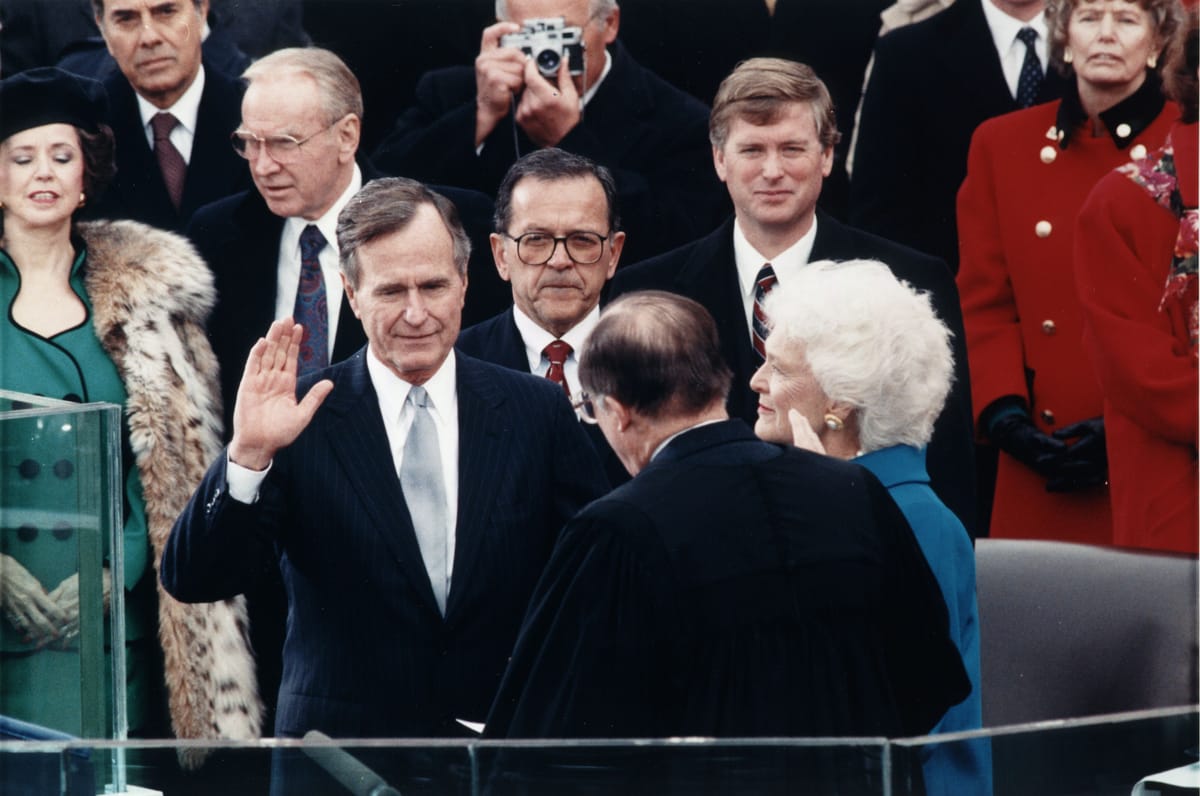

Early Life and Career
George Herbert Walker Bush was born in Milton, Massachusetts, on June 12, 1924. He was the eldest son of Prescott Bush, a successful businessman and later a U.S. senator from Connecticut. Bush attended Phillips Academy, a prestigious preparatory school in Andover, Massachusetts, and later Yale University, where he earned a degree in economics. After graduating from Yale, Bush joined the U.S. Navy and served as a pilot during World War II. He flew 58 combat missions in the Pacific Theater and was awarded the Distinguished Flying Cross.
Following the war, Bush returned to the United States and entered the oil business. He quickly rose through the ranks and eventually became the CEO of a successful oil company. In 1964, Bush entered politics, winning a seat in the U.S. House of Representatives from Texas. He served two terms in the House before being elected to the U.S. Senate in 1966.
In 1971, President Richard Nixon appointed Bush as the U.S. ambassador to the United Nations. Bush served in this role for two years before being appointed as the chairman of the Republican National Committee. In 1976, he was elected vice president under President Gerald Ford.
The 1988 Presidential Election and Bush's Presidency
In 1988, Bush ran for president against Democratic nominee Michael Dukakis. Bush campaigned on a platform of experience, leadership, and a strong national defense. He also promised to continue the economic policies of President Ronald Reagan. Bush won the election by a comfortable margin, carrying 40 states and receiving 426 electoral votes.
Bush's presidency was marked by a number of significant events, including the end of the Cold War, the Persian Gulf War, and the passage of the Americans with Disabilities Act. Bush also appointed two justices to the Supreme Court: David Souter and Clarence Thomas.
The End of the Cold War
One of the most significant events of Bush's presidency was the end of the Cold War. The Cold War, a period of geopolitical tension between the United States and the Soviet Union, had lasted for over 40 years. In 1989, the Berlin Wall fell, and the Soviet Union began to collapse. Bush played a key role in these events, working with Soviet leader Mikhail Gorbachev to bring about a peaceful end to the Cold War.
Bush's handling of the Cold War was widely praised. He was credited with using diplomacy and negotiation to achieve a peaceful resolution to the conflict. His efforts helped to usher in a new era of peace and cooperation between the United States and Russia.
The Persian Gulf War
In 1990, Iraq invaded Kuwait, a small oil-rich nation on the Persian Gulf. Bush responded by assembling a coalition of international forces to liberate Kuwait. The Persian Gulf War, which lasted for several months, ended with the defeat of Iraq.
Bush's handling of the Persian Gulf War was also widely praised. He was credited with building a strong international coalition and using military force to protect the interests of the United States and its allies. The war was a major victory for Bush and helped to solidify his reputation as a strong leader.
Domestic Policy
Bush's domestic policy was generally conservative. He supported tax cuts, deregulation, and a balanced budget. He also signed into law the Americans with Disabilities Act, which prohibits discrimination against people with disabilities.
Bush's domestic policies were not without controversy. Some critics argued that his tax cuts benefited the wealthy at the expense of the poor. Others argued that his deregulation policies led to environmental damage and economic instability.
Legacy
George H.W. Bush left office in 1993 with high approval ratings. He is remembered as a skilled diplomat and a strong leader who helped to end the Cold War and liberate Kuwait. He is also credited with appointing two justices to the Supreme Court and signing into law the Americans with Disabilities Act.
Bush's legacy is complex and multifaceted. He is both praised and criticized for his policies and actions. However, there is no doubt that he was a significant figure in American history.
Conclusion
George H.W. Bush was a complex and fascinating figure. He was a successful businessman, a decorated war hero, and a long-serving public servant. He played a key role in ending the Cold War and liberating Kuwait. His presidency was marked by both successes and failures. However, there is no doubt that he was a significant figure in American history.
Dues are $12 per year. Member benefits:
✅ Ad-Free Website Viewing
✅ Advocacy for Republican Seniors
✅ 120+ Senior Discounts
✅ Member Only Newsletters